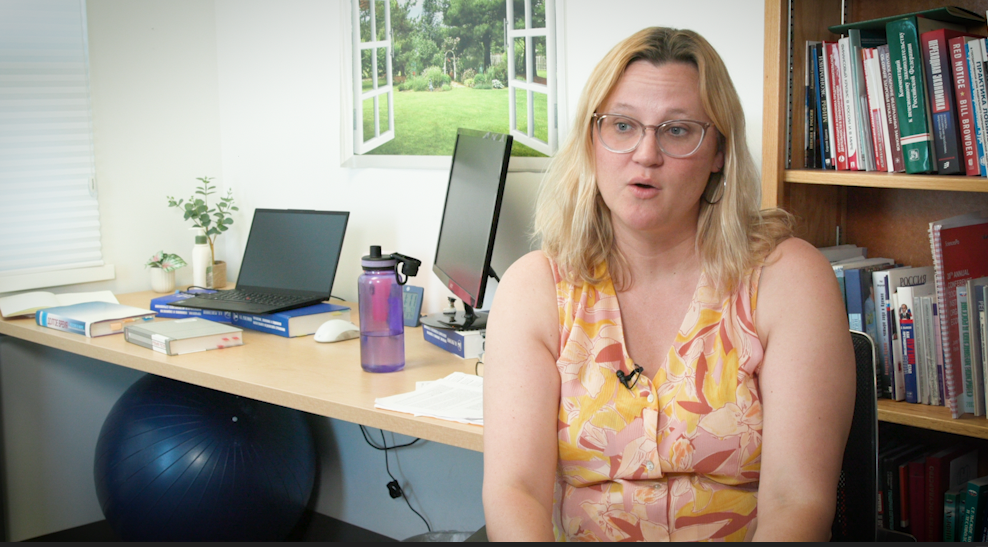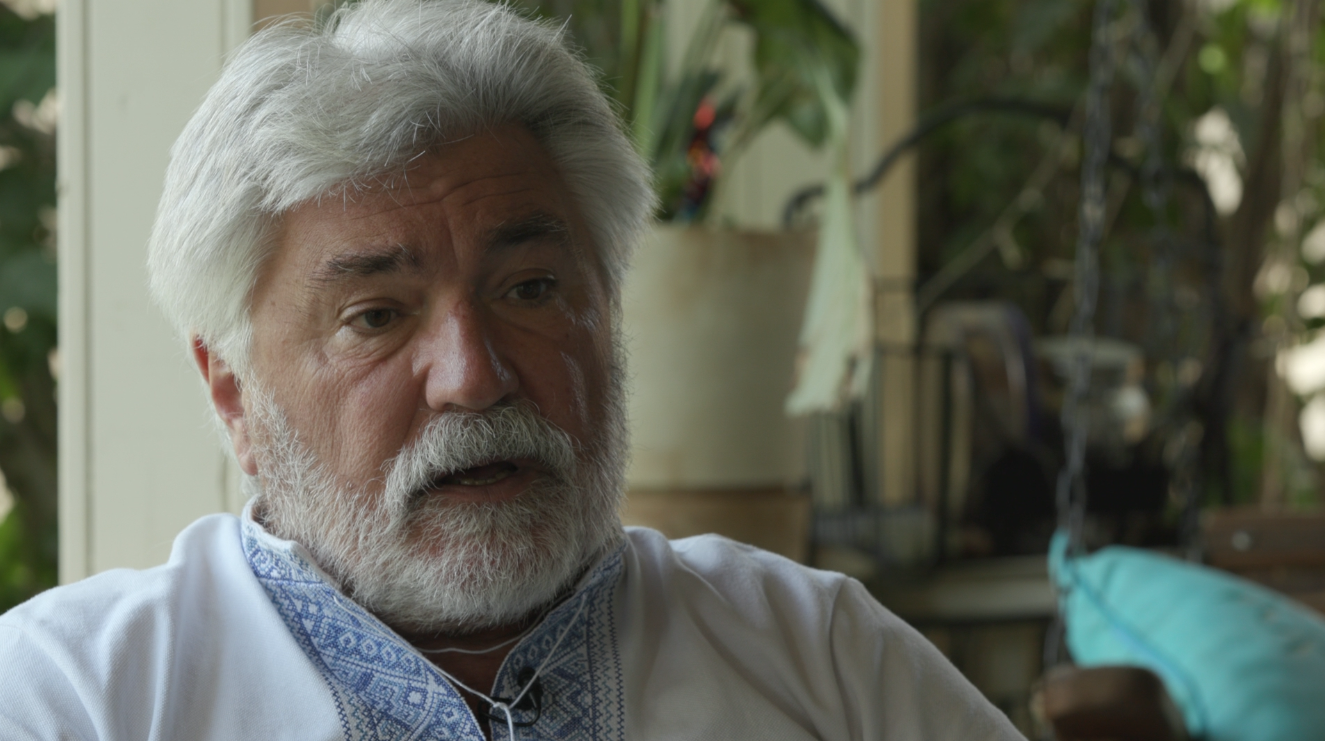'Ukraine is losing the attention of the world'

After more than a year and a half of bloodshed, the war between Russia and Ukraine is ongoing. And while the Russian invasion of Ukraine was the biggest story in the world when it happened, American and international media are not giving the conflict the same attention it received at the beginning of the war, much to the chagrin of the Ukrainian diaspora, including people in Colorado. Overall, Americans are less concerned about the war than they once were, according to a study published just seven months after the invasion (it has now been 18 months since the invasion).
Rocky Mountain PBS sat down with Andy Lenec, a local activist and former Peace Corps volunteer in Ukraine, to talk about the dwindling coverage of the war in Ukraine. We also spoke with Sarah Wilson Sokhey, a professor of political science at the University of Colorado in Boulder, who shared her concern about what would happen if the media begins to ignore this war. The interviews, which you can read below, have been edited for length and clarity.
Interview with Andy Lenec
Rocky Mountain PBS: Andy, what is the latest news from Ukraine that you know?
Andy Lenec: So, in Ukraine, the violence continues as it is at the level of terrorism, really, because every single day there is shelling and the bombs are landing on schools, hospitals, apartment buildings, basically civilian targets. And this may be part of the strategy because Ukraine, unfortunately, has fallen off of the front pages of the news. But if you listen, if you hear from Ukrainians, as I do on a daily basis, you see that bombs are falling in western Ukraine … pretty much throughout the entire country.
RMPBS: Why do you think the news media, specifically commercial and national outlets, are not covering the war as much lately?
AL: This has been a focus of mine and a concern of mine that as this war drags on — it's 540 some odd days at this point — that it's fallen off of the mainstream media. It's fallen out of the consciousness of most Americans. And that's very disconcerting to me. I think there are several reasons for that. The private media in the United States has a very short news cycles and there is competition.
We're living in a very difficult time of humanity right now. So, there are fires, wildfires in Hawaii and in Canada. And the political season has started here in the United States. And it's really difficult for a story to have legs and for the consciousness of the people and the attention span of the people who typically watch television and read media or get their news from the Internet to have a long-range view of any story as it is.
RMPBS: Are Ukrainians in Colorado forgetting about it?
AL: Ukrainians and the Ukrainian diaspora and friends of Ukrainians are clearly not forgetting, because one of the things that Ukrainians do is we advocate, and I think that Ukrainian Americans can do an even better job of advocacy and education. And that's where I plan to put my energies going forward. I think that we need to educate our neighbors, our friends, our fellow members of the churches and the social organizations that we belong to, to educate them about exactly what is happening in Ukraine and why and what the implications are for the rest of the free world.
RMPBS: What people should know about this war?
AL: People should be aware of the horror that has been [put] on Ukraine. The fact that more than 25% of the population are now refugees, have left their homes either for Western Europe or in some instances in the United States, and that there are millions of IDPs or internally displaced persons, people especially from the East, whose homes are gone, whose schools are gone, whose hospitals are gone in the eastern provinces. If you look at what happened in Odessa just a few weeks ago, the massive bombing campaign and again, the brutality of what happened there, there was an agreement that Ukraine, which is one of the largest exporters of grain in the world, was able to export grain to Africa, to Europe, and basically feed people. And when that agreement ended and Russia refused to extend it, they embarked on this horrific campaign of bombing the granaries, bombing the storage facilities. And basically, the implications of that are that there is grain, there is food that was going out to the rest of the world that is not going out right now.
RMPBS: And finally, what is your message for the Ukrainian people in Colorado?
AL: Thank you for asking that question, because I think messaging is critical to Ukraine's ultimate victory in the war. And I have different messages for my fellow Ukrainian Americans: Keep doing what you're doing, but also learn how to turn your friends into advocates. This is what we must learn to do to educate. Let every American who crosses your path know that you are Ukrainian American.
Let them know why they should support Ukraine. Educate them on what is happening in Ukraine on a daily basis, even as our mainstream media does not report on some of these things. So, advocate, educate. That is the message for my friends in Ukraine. Thank you for being so inspiring, for being so heroic. And even though they claim that, no, we're not heroes, every Ukrainian who has chosen to stay in Ukraine is a hero.
Interview with Sarah Wilson Sokhey
Rocky Mountain PBS: After months of extensive coverage about the war in Ukraine, the conflict has taken to the back burner in the U.S. media. What has it been like for the Ukrainians who live there in the past few months?
Sarah Wilson Sokhey: I think it's very hard for Ukrainians to feel like the news from Ukraine is slipping from the headlines in the United States. There is still a lot of coverage of what's going on in Ukraine, but it's not front-page news like it was. And so, my sense of talking to Ukrainians in Ukraine right now is that there are two feelings. One is enormous gratitude for the support from the United States and from Western European countries in supporting Ukraine. And the other is a real fear that Ukraine is losing the attention of the world when things are becoming all the more challenging and they're facing even more threats from Russia.
RMPBS: Recently, Putin attacked areas that he had not attacked before. Has he changed his strategy?
SWS: Some people think that it reflects a renewed strategy from Putin to attack more into the internal territory of Ukraine, especially attacks against Odessa, attacks near Kiev and other places. And so, one possibility is it reflects a renewed commitment to attacking Ukraine. As horrific as that is.
RMPBS: What would happen if this war continued to destabilize the region and what does this mean for the U.S.?
SWS: The long-term effects of Russia's war against Ukraine are hard to exaggerate how consequential and serious this could be. It really is a fight to maintain democracy in Central and Eastern Europe, but in Europe more broadly and around the world, especially when you consider the broader implications of things like Ukraine not being able to ship grain to other parts of the world and that Russia is not going to stop at Ukraine if it has success in Ukraine. The Russian government is likely to pursue military actions in other places, is what many people, many observers are concerned about right now.
RMPBS: In your opinion, is the U.S. doing enough to defend Ukraine and the people?
SWS: The U.S. is doing a lot and I hope that the U.S. government continues to do a lot to support Ukraine because it is so critical. There will always be discussions about which weapons and when those can arrive. So, I think that the U.S. has done a lot and hopefully will continue to do a lot. And there's news coming out even today about the U.S. advising Ukrainian forces on the best tactics and approaches for fighting Russian forces. A lot of this is going on behind the scenes and it's not going to be front page news. But that kind of coordination as well can be really important in supporting Ukrainian forces.
Julio Sandoval is the senior photojournalist at Rocky Mountain PBS. You can reach him at juliosandoval@rmpbs.org.


